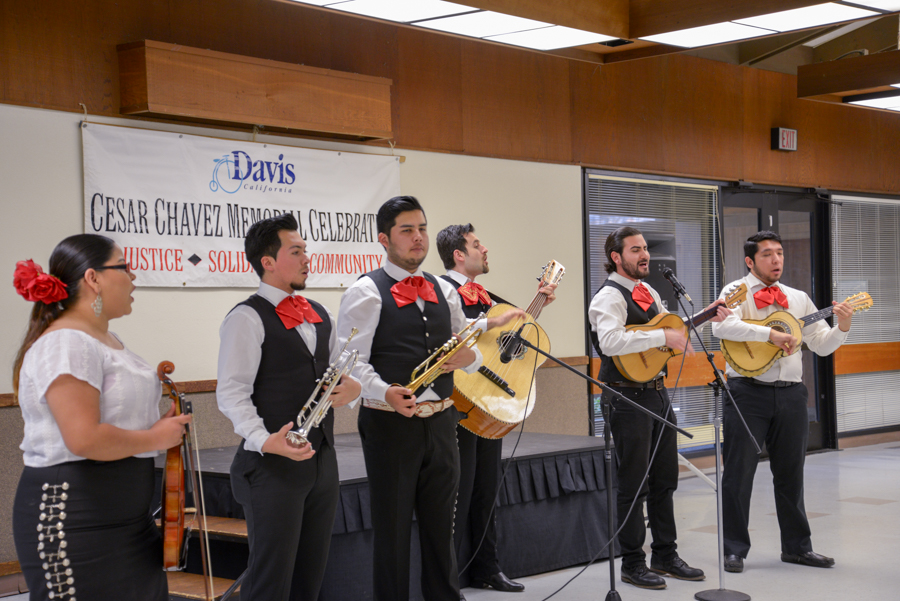The city’s virtual event includes performances from local youth and messages from community voices
On March 31, the City of Davis shared a video in celebration of Cesar Chavez Day. The video features a mix of musical performances and spoken messages. It will be available to view on the city’s YouTube channel until the end of April.
Management Analyst for the Davis City Manager’s Office Carrie Dyer, who oversaw much of the coordination of the video, explained some of the history behind the city’s Cesar Chavez Day event.
“The first Cesar Chavez event was hosted by the Human Relations Committee in 2001,” Dyer said. “One of their charges is to host educational activities that seek to discourage and prevent discrimination and prejudice and to promote diversity, equality and justice.”
Dyer, who also coordinated the city’s Martin Luther King Jr. event and the annual tree lighting event, explained that there are advantages and disadvantages to hosting events virtually.
“There are definitely pros and cons to putting something out virtually like we’ve been doing,” Dyer said. “[We took] some tools from different events. It’s good because we can reach larger audiences that might not be able to tune in for an in-person event, but we also tend to lose people sometimes.”
The video features a mix of performances and messages from Davis Mayor Gloria Partida, the youth music group Mariachi Puente and local activists Rick Gonzales and Justine Villanueva, explained Dyer.
“Longtime community rights activist in town Rick Gonzales provided the farmworkers’ prayer for us, and he has read the farmworkers’ prayer at the Chavez event for years now,” Dyer said. “We also wanted to recognize the role of Filipino workers and youth in our community.”
Hiram Jackson, the co-director of Mariachi Puente, explained the origins of the youth music group and its role in the community.
“I have three kids, and as a parent, I got involved as a music booster. I noticed that there were not as many students that identified as Latino,” Jackson said. “My wife is from Chile and she picked up the vihuela [a type of Spanish stringed instrument]. We focus mostly on junior high students—all of our students are enrolled in a regular music class, and we’ve been around now for about 10 years.”
Jackson explained that while they have not been able to meet in person, Mariachi Puente has found a way to stay active throughout quarantine.
“We’ve been making quarantine videos—we have maybe 10 or 11 performance videos,” Jackson said. “I put together a backing track, and they video themselves performing this track. Then they send their videos in.”
Jackson explained that music plays an important role in celebrating cultural heritage and bringing people together.
“Music is a means of bringing [the] community together and a way of commemorating culture,” Jackson said. “It is a way to be together with other people—I find that sometimes it gets overlooked for that value.”
Partida, who provided the opening remarks for this year’s Cesar Chavez celebration in both Spanish and English, explained that Chavez’s work is still relevant today.
“Essential workers do the difficult task in our society—often for low wages—and have little resources to deal with crises,” Partida said via email. “The inequity of this reality was the impetus for the farm labor movement. As Cesar Chavez said, the fight is always about people.”
Although community members are unable to gather, Partida explained that continuing to hold events such as this one fosters community.
“We must mark the occasions somehow,” Partida said. “It gives us an opportunity to reach out to community members and give them an anchor to hold until we get back to normalcy.”
Partida explained that it is important to remember the collaborative elements of all movements for justice and continue to embody the spirit of collaboration and community today.
“While it is well known that Cesar Chavez was the face of the labor movement, it took much collaboration and many willing to support this cause,” Partida said. “The Filipino community in particular was ahead of Chavez in organizing. As we continue to struggle to make conditions better for farmers and other essential laborers, we must remember to work together and amplify our activism.”
Written by: Yan Yan Hustis Hayes — city@theaggie.org





